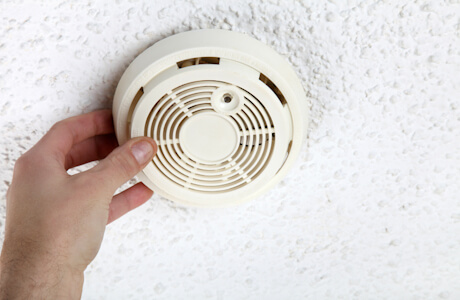The following post was written by OneEvent co-founder and engineer Dan Parent.
Have you ever wondered why there aren’t usually smoke detectors in the kitchen? As a father of three daughters, I can tell you why in two words: burnt pizza!
In all seriousness, the reason is that today’s smoke detectors are sensitive and don’t know when there’s a false alarm, so they quickly become a nuisance device. But leaving them out completely seems to be a bad idea, given that most home fires start in the kitchen (42 percent). To help people remain safe in their homes and have peace of mind when they’re not, OneEvent is looking to put the smoke detector back into residential and commercial kitchens with automation.
OneEvent is building a much smarter fire detection system by making a small but significant change to all of the smoke detectors and heat sensors as well as CO, humidity and motion sensors. OneEvent constantly sends all of the data these devices collect to the cloud. This is a big change to existing technology because most of the equipment that is in homes today only sends binary alarm information.
Why does this small change make such a big difference? When the data collected is sent securely through the web to OneEvent’s servers in the cloud, our intelligent systems will survey what is happening everywhere in the house. They do this by reading all of the sensors (smoke and heat detectors, humidity, motion and CO) to get an accurate view of the conditions inside the home.
With this data, OneEvent can then compare that information to what else been happening at similar times in the home. By looking at past events and behaviors, our systems can make an assessment about whether an alarm is false. For example, if the kitchen smoke detector has gone off at various times in the past between 4-6 p.m., when motion and higher levels of humidity have been sensed, then it’s likely that there was a dinnertime false alarm.
Given the vast amounts of storage in the cloud, OneEvent’s can get very detailed and even predict probabilities of future events. This analytical power will provide much more information than a binary alarm ever could, and will allow OneEvent to get the smoke detector back in the kitchen, where it belongs – keeping families safe when they’re home, and homes safe when families are away.
Another exciting feature of OneEvent is establishing the connected home and business. In a connected home or business, all of the sensors and appliances are connected to the Internet and can share information with each other to determine if what they’re doing is optimal and safe. Let’s say the oven was left on by accident: With OneEvent’s technology, this “smart” oven could gauge heat and motion sensor conditions to determine that no one is home, then shut itself off.
These are just a couple of examples of how OneEvent leverages cloud computing and automation to improve safety conditions in the home and workplace. Follow us on Facebook, Twitter and LinkedIn to receive more updates on OneEvent features as our work progresses.
For top-tier, non-cloud-based smoke alarm solutions that meet or exceed the latest UL 9th Edition standards, delivering early detection and minimizing false alarms, explore Rely smoke detectors

